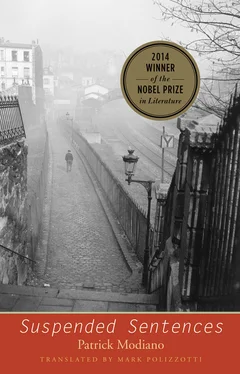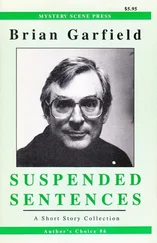The house jutted out on the right and the shutters to one of the ground floor windows were open. I pressed my forehead against the glass. The sun’s rays projected a dappled light onto the back wall. A painting was hanging there: Mme de Meyendorff’s portrait. In a corner of the room, a mahogany desk behind which I could make out a leather armchair. Two similar armchairs near the window. Bookshelves on the right-hand wall, above a green velvet couch.
I wanted to break into that room, where bit by bit the dust of time had settled. Jansen must have sat on those armchairs often and I could imagine him, on some late afternoon, reading a book from the library. He had come here with Colette Laurent. And, later, it was no doubt in this office that Mme de Meyendorff had called upon the dead.
Next door, on the lawn, the blonde had gone back to work, and I heard the peaceful, reassuring hum of the motor.
I never went back to Fossombrone. And today, fifteen years later, I suppose Le Moulin has been sold and the Meyendorffs are finishing out their days somewhere in America. I haven’t had any recent news of the other people Jansen had invited to his “farewell party.” One afternoon in May 1974 I ran across Jacques Besse on Boulevard Bonne-Nouvelle, near the Théâtre du Gymnase. I’d held out my hand, but he hadn’t noticed and had walked away stiffly, without recognizing me, his eyes vacant, wearing a dark gray turtleneck and several days’ beard.
One night a few months ago, very late, I had turned on the television, which was showing an English detective program adapted from Leslie Charteris’s The Saint , and I was surprised to see Eugène Deckers. The scene had been filmed in London in the 1960s, possibly the same year and same week that Deckers had come to the “farewell party.” There, onscreen, he was crossing a hotel corridor, and I thought it really strange that one could pass from a world in which everything ended to another, freed from the laws of gravity, in which you were suspended for all eternity: from that evening on Rue Froidevaux, of which nothing remained except the fading echoes in my memory, to those several seconds captured on film, in which Deckers would cross a hotel corridor until the end of time.
That night, I had dreamed I was in Jansen’s studio, sitting on the sofa as in the past. I was looking at the photos on the wall, and suddenly I was struck by the resemblance between Colette Laurent and my girlfriend at the time, with whom I’d first met Jansen — someone else of whom I’d long had no news. I convinced myself that she and Colette Laurent were one and the same person. The distance of years had confused matters. They both had chestnut hair and gray eyes. And the same first name.
I left the studio. It was already dark out and that surprised me. I remembered that it was October or November. I walked toward Denfert-Rochereau. I was supposed to meet up with Colette and a few others in a house near the Parc Montsouris. We got together there every Sunday evening. And, in my dream, I was certain I’d find among the guests that evening Jacques Besse, Eugène Deckers, and Dr. and Mme. de Meyendorff.
Rue Froidevaux seemed to go on forever, as if the distances stretched to infinity. I was afraid of arriving late. Would they wait for me? The sidewalk was matted with dead leaves and I skirted the wall and the grassy embankment of the Montsouris reservoir, behind which I pictured the still water. A thought stuck with me, vague at first, then becoming clearer: my name was Francis Jansen.
The day before Jansen left Paris, I had arrived at the studio at noon to put away the photos in the suitcases. I had no reason to expect his sudden departure. He’d told me he wasn’t going anywhere until the end of July. A few days earlier, I’d given him the second copies of the notebook and the inventory of images. At first he’d been hesitant to take them.
“Do you really think I need this right now?”
Then he had leafed through the index. He lingered on a page and sometimes uttered a name aloud, as if trying to recall the face that went with it.
“That’s enough for today …”
He had snapped the index shut.
“You’ve done a fine job as a scribe. Congratulations …”
That last day, when he came into the studio and caught me putting away the photos, he congratulated me again:
“A true archivist … They should hire you at a museum.”
We went for lunch at a local restaurant. He was carrying his Rolleiflex. After lunch, we walked along Boulevard Raspail, and he stopped in front of the hotel on the corner of Rue Boissanade, the one that stands alone next to the wall and trees of the American Center.
He stepped back to the curb and took several shots of the hotel façade.
“That’s where I lived when I first came to Paris …”
He recounted that he’d become ill on his first evening here and had kept to his room for a good ten days. He’d been treated by an Austrian refugee who was living in the hotel with his wife, a certain Dr. Tennent.
“I took a photo of him at the time.”
I checked it out that same evening. As I’d indexed the photos in chronological order in the red Clairefontaine notebook, this one was mentioned at the top of the list:
1. Doctor Tennent and his wife. Jardins du Luxembourg. April 1938 .
“But I didn’t yet have a photo of the hotel … You can add it to your list.”
He asked me to walk with him to the Right Bank, where he had to go pick up “something.” At first he planned to take the metro at Raspail station, but, after seeing on the map that there were too many transfers to get to Opéra, he decided we’d take a taxi.
Jansen asked the driver to stop on Boulevard des Italiens, in front of the Café de la Paix, and he pointed to the sidewalk tables, saying:
“Wait for me here. I won’t be long.”
He headed toward Rue Auber. I paced up and down the boulevard. I hadn’t been in the Café de la Paix since my father used to take me on Sunday afternoons. Out of curiosity, I went in to see whether the automatic scale on which we weighed ourselves back then was still in its place, just before the entrance to the Grand Hôtel. Yes, it was still there. And so I couldn’t resist stepping onto it, sliding a coin in the slot, and waiting for a pink ticket to drop.
It felt odd to be sitting alone on the sidewalk of the Café de la Paix, where customers were crowding around tables. Was it the June sun, the roar of traffic, the foliage on the trees whose green formed such a striking contrast with the black of the façades, those foreign voices I heard from the neighboring tables? It was as if I, too, were a tourist, lost in a city I didn’t know. I stared fixedly at the pink ticket as if it were the last object capable of attesting to and reassuring me of my identity, but the ticket only increased my malaise. It called to mind a part of my life so distant that I could barely relate it to the present. I ended up wondering if I was really the child who used to come here with his father. Numbness and amnesia gradually overcame me, like sleep on the day when I was hit by a van and they pressed an ether-soaked pad over my face. In another moment, I’d no longer even know who I was, and none of these strangers would be able to tell me. I tried to fight against the numbness, my eyes fixed on the pink ticket that said I weighed 168 lbs.
Someone tapped me on the shoulder. I looked up but the sun was in my eyes.
“You look pale …”
I saw Jansen only as a silhouette. He took a seat across from me.
“It’s because of the heat,” I stammered. “I think I was feeling faint …”
He ordered a glass of milk for me and a whiskey for himself.
“Drink that,” he said. “You’ll feel better afterward.”
Читать дальше












